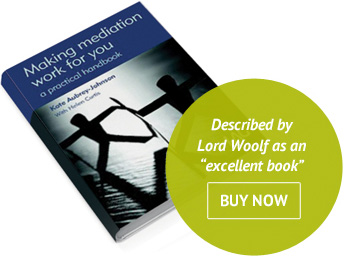BLOG
The Balance of Power – the right to a lawyer at mediation
December 17, 2020
Kate Aubrey-Johnson considers the recent case of L Kumar v LB of Hillingdon [2020] EWHC 3326 (Admin) and its implications for SEND mediation in which Mrs Justice Collins Rice said,
‘Local authorities have huge powers over the lives of families with children who have special needs, making decisions with potentially lifelong consequences. Where parents are unhappy with those decisions, there is a fundamental and frightening inequality of power.’ [ para 31]
In recent years, data from the Department for Education records a significant rise in Special Educational Needs and Disability (SEND) mediation with 3200 mediations taking place in 2018. SEND disputes are particularly suited to mediation because of the importance of swiftly resolving how best to meet the special educational needs of a child to enable them to access education and make progress. Delays can be disastrous. The benefits can be immeasurable.
In Kumar, the High Court was required to rule upon the legality of the London Borough of Hillingdon’s refusal to allow Ms Kumar’s lawyer to attend mediation.
Legal framework
Similar to the requirement to consider mediation in family disputes, the Children and Families Act 2014 (“CFA 2014”) places SEND mediation on a statutory footing. Where families are in dispute with their local authority over an EHCP (or a refusal to undertake a needs assessment) there is a legal right to mediation (section 52 CFA 2014) and a corresponding legal duty on the local authority (section 53 CFA 2014) to arrange and participate in mediation. Where the issues are either limited to or include health care provision, the duty to arrange and participate in the mediation falls to the responsible commissioning body.
The Special Educational Needs and Disability Regulations 2014 (‘the 2014 Regulations’) provide a legal framework for the provision of mediation. Once requested, a local authority must arrange mediation within 30 days of the request (Regulation 36). The practical arrangements will usually be carried out by a SEND mediation provider, such as KIDS SEN mediation and Global Mediation. SEN mediators are accredited by the College of Mediators & the Civil Mediation Council.
Regulation 38(1) of the 2014 Regulations provides:
‘The following persons may attend the mediation –
(a) the parties to the mediation;
(b) any advocate or other supporter that the child’s parent or the young person wishes to attend the mediation;
…
(e) any other person, with the consent of all of the parties to the mediation, or where there is no such agreement, with the consent of the mediator.’
The SEND Code of Practice also provides statutory guidance for local authorities, schools and other organisations working with and supporting children with special educational needs and disabilities on duties, policies and procedures arising from the SEND legislative framework. This includes a section on ‘effective mediation’ and addresses the attendance of lawyers,
‘…generally, legal representation should not be necessary at the mediation, but this will be a matter for the parties and the mediator to agree. If either party does have legal representation they will have to pay for it themselves” [paragraph 11.38]
The Kumar judgment
This case considered the issue about a parent’s right to attend mediation with an advocate or other support under Regulation 38 of the 2014 Regulations. The question was whether a parent is entitled to bring a lawyer to mediation by virtue of Regulation 38(1)(b). Hillingdon sought to argue that the definition of ‘advocate’ excluded legal representatives and therefore if a party wished to attend with their lawyer this would require the consent of both parties as is set out in Regulation 38(1)(e).
In her judgment, Mrs Justice Collins Rice, summarised the issues and in finding Hillingdon in breach of its statutory duties said,
‘I was invited in this case to reflect on the meaning of the word ‘advocate’. The real question in my view is whether there is legal authority to be found in the 2014 Act, or the Regulations made under it, for a local authority to control whom a parent wishes to bring with them to an EHCP mediation for support, and to refuse to arrange for or participate in mediation if it does not approve of that person, on the grounds that they are a lawyer or for any other reason. The answer is no.’ [para 35 emphasis added]
This excerpt from the judgement is worthy of note:
‘Nowhere in this scheme is there any suggestion that a local authority is entitled to control whom a parent wishes to bring to an independent mediation for support. The fact that it is someone the parent wishes to have there for that purpose is enough, and important in its own right. That person – whoever they are – may or may not prove an asset to the mediation process or make the mediator’s job any easier. That is not the point. The point is that the parent is not alone, and has someone there of their choosing, a choice entirely up to them’ [para 30]
Challenges ahead
This case throws up some important issues about the integrity of the mediation process. It is important to acknowledge, as the Kumar case helpfully articulates, that local authorities hold ‘huge powers’ over the lives of families with children who have special educational needs. And while mediation offers potential benefits it can provide a real challenge for mediators to address the potential imbalance of power.
The Kumar case wasn’t required to consider the situation where a local authority proposes attending mediation with a lawyer and the parent attends alone. This is another situation where the imbalance is also keenly felt. In such situations the legal framework is clear, any other person may only attend ‘with the consent of all of the parties to the mediation, or where there is no such agreement, with the consent of the mediator.’ [Regulation 38(1)(e)]. It is perhaps this situation the statutory guidance, at para 11.38 mentioned above, was seeking to address.
It is also worth reminding ourselves that while mediation is informal and without prejudice, lawyers (and other advisers) are able to help and support families resolving their disputes. For families they ensure that local authorities, schools and other organisations meet their legal duties and obligations. Without legal or other professional advice available through SENDIAS (Special Educational Needs and Disabilities Information Advice and Support) services and charities, such as IPSEA, mediation may be a less effective or less ‘fair and just’ remedy for families.
There is, of course, the argument that local authorities are not free to choose whether to participate in mediation as they have a statutory duty to attend. In my opinion, however, the benefits to the local authority of reaching a resolution and avoiding the cost, expense, uncertainty and reputational impact of litigation usually ensures local authorities are willing participants. In recent months, overcoming the challenges caused by the pandemic and delivering online mediation, I have been particularly impressed by the willingness and motivation of local authority representatives to seek to resolve matters at mediation.
The Kumar judgment is to be welcomed as it clarifies the position that parents can choose to bring a supporter to mediation and the local authority has no legal basis to object or refuse to participate if they disapprove of the attendance of that one supporter. Of course, it is then for the skill of the mediator to ensure that the supporter does not adversely affect the mediation process and enable the parties to reach a resolution for the child.

